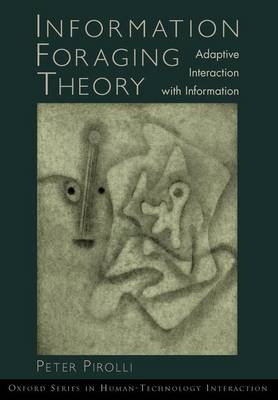
Information Foraging Theory
Oxford University Press Inc (Verlag)
978-0-19-538779-7 (ISBN)
Thus, it is fortunate that a new field of research, Adaptive Information Interaction (AII), is becoming possible. AII centers on the problems of understanding and improving human-information interaction. It is about how people will best shape themselves to their information environments, and how information environments can best be shaped to people. Its roots lie in human-computer interaction (HCI), information retrieval, and the behavioral and social sciences.
This book is about Information Foraging Theory (IFT), a new theory in Adaptive Information Interaction that is one example of a recent flourish of theories in adaptationist psychology that draw upon evolutionary-ecological theory in biology. IFT assumes that people (indeed, all organisms) are ecologically rational, and that human information-seeking mechanisms and strategies adapt the structure of the information environments in which they operate. Its main aim is to create technology that is better shaped to users. Information Foraging Theory will be of interest to student and professional researchers in HCI and cognitive psychology.
Peter Pirolli is a Research Fellow in the User Interface Research Area at the Palo Alto Research Center where he has been pursuing studies of human information interaction since 1991. He is an elected Fellow of the Association for Computing Machinery Computer-Human Interaction Academy, the American Association for the Advancement of Science, the Association for Psychological Science, and the National Academy of Education.
1. Information Foraging Theory: Framework and Method ; 2. Elementary Foraging Models ; 3. The Ecology of Information Foraging on the World Wide Web ; 4. Rational Analyses of Information Scent and Web Foraging ; 5. A Cognitive Model of Information Foraging on the Web ; 6. A Rational Analysis and Computational Cognitive Model of the Scatter/Gather Document Cluster Browser ; 7. Stochastic Models of Information Foraging by Information Scent ; 8. Social Information Foraging ; 9. Design Heuristics, Engineering Models, and Applications ; 10. Future Directions: Upward, Downward, Inward, and Outward
| Erscheint lt. Verlag | 8.4.2010 |
|---|---|
| Reihe/Serie | Human Technology Interaction Series |
| Zusatzinfo | numerous line drawings/tables |
| Verlagsort | New York |
| Sprache | englisch |
| Maße | 251 x 175 mm |
| Gewicht | 462 g |
| Themenwelt | Geisteswissenschaften ► Psychologie ► Allgemeine Psychologie |
| Geisteswissenschaften ► Psychologie ► Sozialpsychologie | |
| Geisteswissenschaften ► Psychologie ► Test in der Psychologie | |
| Geisteswissenschaften ► Psychologie ► Verhaltenstherapie | |
| Mathematik / Informatik ► Informatik ► Theorie / Studium | |
| ISBN-10 | 0-19-538779-1 / 0195387791 |
| ISBN-13 | 978-0-19-538779-7 / 9780195387797 |
| Zustand | Neuware |
| Haben Sie eine Frage zum Produkt? |
aus dem Bereich


